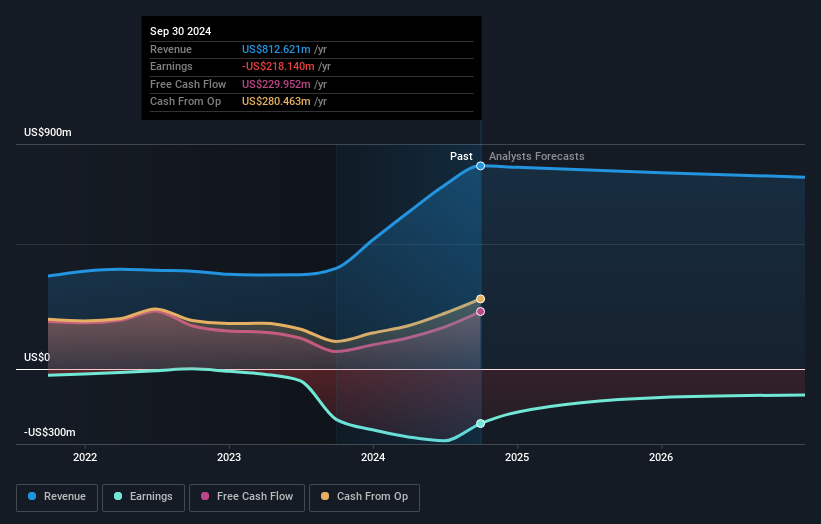- United States
- /
- REITS
- /
- NYSE:GNL
An excellent week for Global Net Lease, Inc.'s (NYSE:GNL) institutional owners who own 75% as one-year returns inch higher

Key Insights
- Institutions' substantial holdings in Global Net Lease implies that they have significant influence over the company's share price
- The top 7 shareholders own 51% of the company
- Analyst forecasts along with ownership data serve to give a strong idea about prospects for a business
To get a sense of who is truly in control of Global Net Lease, Inc. (NYSE:GNL), it is important to understand the ownership structure of the business. And the group that holds the biggest piece of the pie are institutions with 75% ownership. Put another way, the group faces the maximum upside potential (or downside risk).
Last week’s 3.6% gain means that institutional investors were on the positive end of the spectrum even as the company has shown strong longer-term trends. One-year return to shareholders is currently 0.6% and last week’s gain was the icing on the cake.
In the chart below, we zoom in on the different ownership groups of Global Net Lease.
View our latest analysis for Global Net Lease

What Does The Institutional Ownership Tell Us About Global Net Lease?
Institutions typically measure themselves against a benchmark when reporting to their own investors, so they often become more enthusiastic about a stock once it's included in a major index. We would expect most companies to have some institutions on the register, especially if they are growing.
We can see that Global Net Lease does have institutional investors; and they hold a good portion of the company's stock. This can indicate that the company has a certain degree of credibility in the investment community. However, it is best to be wary of relying on the supposed validation that comes with institutional investors. They too, get it wrong sometimes. It is not uncommon to see a big share price drop if two large institutional investors try to sell out of a stock at the same time. So it is worth checking the past earnings trajectory of Global Net Lease, (below). Of course, keep in mind that there are other factors to consider, too.

Investors should note that institutions actually own more than half the company, so they can collectively wield significant power. Hedge funds don't have many shares in Global Net Lease. The company's largest shareholder is The Vanguard Group, Inc., with ownership of 14%. BlackRock, Inc. is the second largest shareholder owning 14% of common stock, and Bellevue Capital Partners, LLC holds about 13% of the company stock.
We did some more digging and found that 7 of the top shareholders account for roughly 51% of the register, implying that along with larger shareholders, there are a few smaller shareholders, thereby balancing out each others interests somewhat.
Researching institutional ownership is a good way to gauge and filter a stock's expected performance. The same can be achieved by studying analyst sentiments. Quite a few analysts cover the stock, so you could look into forecast growth quite easily.
Insider Ownership Of Global Net Lease
While the precise definition of an insider can be subjective, almost everyone considers board members to be insiders. Company management run the business, but the CEO will answer to the board, even if he or she is a member of it.
Insider ownership is positive when it signals leadership are thinking like the true owners of the company. However, high insider ownership can also give immense power to a small group within the company. This can be negative in some circumstances.
Our information suggests that Global Net Lease, Inc. insiders own under 1% of the company. It's a big company, so even a small proportional interest can create alignment between the board and shareholders. In this case insiders own US$9.7m worth of shares. It is good to see board members owning shares, but it might be worth checking if those insiders have been buying.
General Public Ownership
With a 24% ownership, the general public, mostly comprising of individual investors, have some degree of sway over Global Net Lease. This size of ownership, while considerable, may not be enough to change company policy if the decision is not in sync with other large shareholders.
Next Steps:
It's always worth thinking about the different groups who own shares in a company. But to understand Global Net Lease better, we need to consider many other factors. To that end, you should learn about the 2 warning signs we've spotted with Global Net Lease (including 1 which is a bit unpleasant) .
If you would prefer discover what analysts are predicting in terms of future growth, do not miss this free report on analyst forecasts.
NB: Figures in this article are calculated using data from the last twelve months, which refer to the 12-month period ending on the last date of the month the financial statement is dated. This may not be consistent with full year annual report figures.
New: Manage All Your Stock Portfolios in One Place
We've created the ultimate portfolio companion for stock investors, and it's free.
• Connect an unlimited number of Portfolios and see your total in one currency
• Be alerted to new Warning Signs or Risks via email or mobile
• Track the Fair Value of your stocks
Have feedback on this article? Concerned about the content? Get in touch with us directly. Alternatively, email editorial-team (at) simplywallst.com.
This article by Simply Wall St is general in nature. We provide commentary based on historical data and analyst forecasts only using an unbiased methodology and our articles are not intended to be financial advice. It does not constitute a recommendation to buy or sell any stock, and does not take account of your objectives, or your financial situation. We aim to bring you long-term focused analysis driven by fundamental data. Note that our analysis may not factor in the latest price-sensitive company announcements or qualitative material. Simply Wall St has no position in any stocks mentioned.
About NYSE:GNL
Global Net Lease
Global Net Lease, Inc. (NYSE: GNL) is a publicly traded real estate investment trust listed on the NYSE.
Undervalued with imperfect balance sheet.


